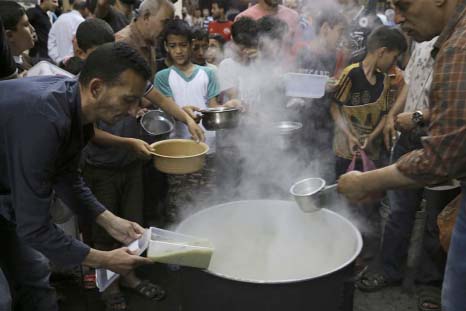
AP, Gaza City :
Samia Hassan used to have enough money to feed her two dozen children and grandchildren. Now she spends much of her time worrying about food, scouring Gaza’s vegetable markets for end-of-day discounts or walking miles for a pot of free gruel from a soup kitchen.
Large numbers of Gaza families have been pushed deeper into poverty in recent months by Palestinian political infighting and the freezing of U.S. aid. Life is tougher than ever for most of the 2 million Palestinians locked into tiny, blockaded Gaza, where electricity is off most hours of the day, unemployment approaches 50 percent and the Islamic militant group Hamas rules with a tight grip.
“It’s a perfect storm,” said Hilary DuBose of the Catholic Relief Services, which has had to forego emergency food distributions because the Trump administration is withholding funds. “At the same time that the humanitarian situation in Gaza is worsening, humanitarian aid is disappearing.”
Growing despair in Gaza has helped drive recent Hamas-led protests against the border blockade by Israel and Egypt. The closure was imposed after Hamas, branded a terrorist group by Israel and the West, seized Gaza in 2007, driving out forces loyal to Palestinian President Mahmoud Abbas.
The escalating crisis also spotlights the lack of a coherent Gaza policy by the external players trying to shape its future. Israel and Egypt say they need the blockade to contain Hamas, but have not offered a viable plan for Gaza. The international community wants the blockade lifted, but hasn’t said how it would deal with Hamas, which refuses to disarm or renounce violence.
Hassan – who shares her unfinished cinderblock home with seven of her 12 adult children, three daughters-in-law and 16 grandchildren – said she joined the border protests repeatedly, intentionally getting close to the fence in hopes of getting shot and killed by Israeli troops.
“Death is better than this life,” she said to her sons’ astonishment as the family gathered for the meal breaking the dawn-to-dusk fast of the Muslim holy month of Ramadan.
Hassan said she only pulled back because she realized she could end up crippled rather than dead and become a burden. In the past two months, more than 115 Palestinians have been killed and close to 3,800 wounded by Israeli fire in near-weekly border protests, with some facing lifelong disabilities.
Hassan, who wears the black robe and full face veil of ultra-conservative Muslim women, is angry at Hamas, which has fought three cross-border wars with Israel.
In the last war in 2014, the family taxi, an important source of income, was destroyed in an Israeli airstrike on a neighbor’s house. After the war’s devastation, her sons only found work sporadically and one – a father of six – is now in jail for being unable to pay his debts.
Samia Hassan used to have enough money to feed her two dozen children and grandchildren. Now she spends much of her time worrying about food, scouring Gaza’s vegetable markets for end-of-day discounts or walking miles for a pot of free gruel from a soup kitchen.
Large numbers of Gaza families have been pushed deeper into poverty in recent months by Palestinian political infighting and the freezing of U.S. aid. Life is tougher than ever for most of the 2 million Palestinians locked into tiny, blockaded Gaza, where electricity is off most hours of the day, unemployment approaches 50 percent and the Islamic militant group Hamas rules with a tight grip.
“It’s a perfect storm,” said Hilary DuBose of the Catholic Relief Services, which has had to forego emergency food distributions because the Trump administration is withholding funds. “At the same time that the humanitarian situation in Gaza is worsening, humanitarian aid is disappearing.”
Growing despair in Gaza has helped drive recent Hamas-led protests against the border blockade by Israel and Egypt. The closure was imposed after Hamas, branded a terrorist group by Israel and the West, seized Gaza in 2007, driving out forces loyal to Palestinian President Mahmoud Abbas.
The escalating crisis also spotlights the lack of a coherent Gaza policy by the external players trying to shape its future. Israel and Egypt say they need the blockade to contain Hamas, but have not offered a viable plan for Gaza. The international community wants the blockade lifted, but hasn’t said how it would deal with Hamas, which refuses to disarm or renounce violence.
Hassan – who shares her unfinished cinderblock home with seven of her 12 adult children, three daughters-in-law and 16 grandchildren – said she joined the border protests repeatedly, intentionally getting close to the fence in hopes of getting shot and killed by Israeli troops.
“Death is better than this life,” she said to her sons’ astonishment as the family gathered for the meal breaking the dawn-to-dusk fast of the Muslim holy month of Ramadan.
Hassan said she only pulled back because she realized she could end up crippled rather than dead and become a burden. In the past two months, more than 115 Palestinians have been killed and close to 3,800 wounded by Israeli fire in near-weekly border protests, with some facing lifelong disabilities.
Hassan, who wears the black robe and full face veil of ultra-conservative Muslim women, is angry at Hamas, which has fought three cross-border wars with Israel.
In the last war in 2014, the family taxi, an important source of income, was destroyed in an Israeli airstrike on a neighbor’s house. After the war’s devastation, her sons only found work sporadically and one – a father of six – is now in jail for being unable to pay his debts.

